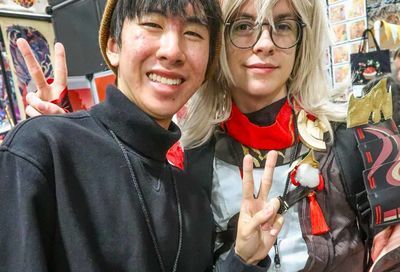Film Review: My Name Is Pauli Murray
"My Name Is Pauli Murray" sharply illuminates its subject's heroic lifelong fight for human rights.

Passionate activist, pioneering Black non-binary human, and brilliant legal strategist Dr. Anna Pauline Murray didn’t achieve the renown of some of the civil rights giants influenced by her work and mission. But forward-thinking figures, from Thurgood Marshall to Eleanor Roosevelt and Ruth Bader Ginsburg, trusted and relied on Murray’s keen mind and sound arguments. Largely unsung to the masses, Murray, who died in 1985 at the age of 74, was revered in legal and scholarly circles, and lived an extraordinary life that’s brought clearly into focus in Julie Cohen and Betsy West’s vivid documentary portrait My Name Is Pauli Murray (★★★★☆).
Cohen and West’s 2018, Oscar-nominated documentary RBG cast the late Supreme Court justice in the intimate light of wife and mother, while offering a thorough account of her landmark cases and achievements. The pair’s take on Murray is similarly balanced, placing the trailblazer’s life and career in cogent historical, legal, and cultural contexts, while also revealing intimate aspects of her identity and character. This is a remarkable person who literally blazed trails, living for a time during the Depression as a vagabond on the rails, often passing as male while hitching rides across the Midwest.
The film’s firm direction and editing bring bygone eras chugging to life with finely layered elements of personal memorabilia, stock photos and film footage, sound effects, and recordings made by Murray narrating her memoirs. Whether Murray might want us referring to the memoirs as “hers,” “his,” or “theirs” is a matter addressed by enlightening interviews with trans activists Raquel Willis and Dolores Chandler, former coordinator at the Pauli Murray Center for History and Social Justice in Durham, North Carolina. The film also includes Murray’s own moving correspondence with her doctors putting into arresting words the gender dysphoria that marked her existence from childhood. She was “a girl who should have been a boy,” Murray wrote.
The struggle to match gender experience to physical presence profoundly affected Murray’s romantic relationships, as recounted in the memoir recordings, and by scholars like Patricia Bell-Scott, who wrote the book detailing Murray’s unlikely friendship with First Lady Roosevelt. Pauli and Eleanor were just friends, Bell-Scott insists, but the movie sweetly profiles Murray’s longtime companion Irene “Renee” Barlow, and Peggy Holmes, a star-crossed young love from the Depression-era days of hitching rides. That early breakup led to Murray’s first stint in a mental institution, among what would eventually be a lengthy history of emotional breakdowns and episodes. My Name Is Pauli Murray relays the facts of the subject’s psychological distress with utter sensitivity, taking cues from the candor in her own poetic language.
Murray’s poetry, in addition to the legal papers that are the foundation of her legacy, and her work as an educator and as the first ordained Black woman Episcopalian priest only begin to encompass all that she contributed to the world. The movie can only begin to contain the breadth of Murray’s groundbreaking accomplishments and landmark battles, her astounding path from spitfire Southern orphan to Howard University Law student and anti-segregationist crusader defeating Jim Crow laws in 1940s D.C., radical women’s and civil rights activist, ACLU lawyer, National Organization of Women co-founder, and enduring inspiration for seekers of justice everywhere.
Bursting with insight and information, the movie loops and digresses through an occasionally hazy chronology of events. Yet the subject and her precise, persuasive voice resonate unmistakably, speaking directly to the here and now. “America, be what you proclaim yourself to be!”
My Name Is Pauli Murray is playing at Landmark’s E Street Cinema, and is available for streaming October 1 on Prime Video. Visit www.landmarktheatres.com or www.amazon.com.
Read More:
PRIDEtoberfest at Wunder Garten: Everything You Need to Know
HBO Max’s giddy, relatable “The Other Two” is essential viewing
The Kennedy Center celebrates 50 years with a spectacular evening of performances
Support Metro Weekly’s Journalism
These are challenging times for news organizations. And yet it’s crucial we stay active and provide vital resources and information to both our local readers and the world. So won’t you please take a moment and consider supporting Metro Weekly with a membership? For as little as $5 a month, you can help ensure Metro Weekly magazine and MetroWeekly.com remain free, viable resources as we provide the best, most diverse, culturally-resonant LGBTQ coverage in both the D.C. region and around the world. Memberships come with exclusive perks and discounts, your own personal digital delivery of each week’s magazine (and an archive), access to our Member's Lounge when it launches this fall, and exclusive members-only items like Metro Weekly Membership Mugs and Tote Bags! Check out all our membership levels here and please join us today!




















You must be logged in to post a comment.